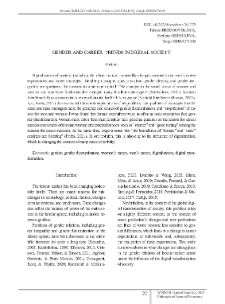Օբյեկտ
Վերնագիր: Gender and Career: Trends in Digital Society
Ամսագրի կամ հրապարակման վերնագիր:
Հրապարակման ամսաթիվ:
Հատոր:
Համար:
ISSN:
Համատեղ հեղինակները:
Խ․ Աբովյանի անվան հայկական պետական մանկավարժական համալսարան
Ծածկույթ:
Ամփոփում:
Digitalization of society, including the labour market, noticeably changes women‟s and men‟s career expectations and career strategies. Gender philosophy, questions about gender identity, and gender inequality are questions, the answers to which are critical: “the changes in the social status of women and men in our time have fundamentally changed many familiar stereotypes” (Mikhailova, 2011). Kontakt InterSearch Russia conducted a series of studies for Forb‟s magazine (Kontakt InterSearch Russia, 2021a, b, c; Forbs, 2021) that evaluated the career expectations of respondents; the qualities of managers that fe-male and male managers lack; the presence and causes of gender discrimination; and “stop-factors” of ca-reer for men and women. It was found that female executives twice as often as male executives face gen-der discrimination; women more often than men consider their personal qualities as the reason for career success (menmore often than women cite external aspects such as “mentor” and “good timing” among the reasons for career success). At the same time, experts noted that “the boundaries of “female” and “male” qualities are blurring” (Forbs, 2021). In our opinion, this is also due to the influence of digitalization, which is changing the content of many areas of activity.
Հրատարակության վայրը:
Երևան
Հրատարակիչ:
Ձևաչափ:
Նույնացուցիչ:
oai:arar.sci.am:371134
Լեզու:
Օբյեկտի հավաքածուներ:
Վերջին անգամ ձևափոխված:
Oct 8, 2025
Մեր գրադարանում է սկսած:
Mar 15, 2024
Օբյեկտի բովանդակության հարվածների քանակ:
76
Օբյեկտի բոլոր հասանելի տարբերակները:
https://arar.sci.am/publication/401025
Ցույց տուր նկարագրությունը RDF ձևաչափով:
Ցույց տուր նկարագրությունը OAI-PMH ձևաչափով։
-
Իմաստություն=Wisdom=Мудрость
-
Իմաստություն, 2013, N 1
-
Իմաստություն, 2014, N 1 (2)
-
Իմաստություն, 2014, N 2 (3)
-
Իմաստություն, 2015, N 1 (4)
-
Wisdom, 2015, N 2 (5)
-
Wisdom, 2016, N 1 (6)
-
Wisdom, 2016, N 2 (7)
-
Wisdom, 2017, N 1 (8)
-
Wisdom, 2017, N 2 (9)
-
Wisdom, 2018, N 1 (10)
-
Wisdom, 2018, N 2 (11)
-
Wisdom, 2019, N 1 (12)
-
Wisdom, 2019, N 2 (13)
-
Wisdom, 2020, N 1 (14)
-
Wisdom, 2020, N 2 (15)
-
Wisdom, 2020, N 3 (16)
-
Wisdom, 2021, N 1 (17)
-
Wisdom, 2021, N 1 (1) Special issue
-
Wisdom, 2021, N 2 (18)
-
Wisdom, 2021, N 3 (19)
-
Wisdom, 2021, N 4 (20)
-
Wisdom, 2022, N 1 (21)
-
Wisdom, 2022, N 1 (2) Special issue
- Editorial board
- Contents
- Editor`s Foreword
- On Identification, Identity, and Security Issues in Modern Armenia
- Business Philosophy: Modern Trends and Digital Solutions
- Gender and Career: Trends in Digital Society
- Development of the National Qualifications System: The Impact of Transhumanism
- Artificial Intelligence Methods in Predicting the Productivity of Project Teams: Transhumanism and Experience in Practical Research
- Studies in the Experience of Philosophical and Anthropological Analysis of Digital Education in the Realm of Digital Technologies
- The Paradigm of Innovative Economic Development: a New Philosophy or the Basis of Evolu-tion in the Conditions of Digitalisation
- Advanced Vocational Training of Schoolchildren: Philosophical Aspects of Understanding
- The Impact of Artificial Intelligence on Human Resources Management Strategy: Opportunities for the Humanisation and Risks
- Social Discrimination in the Epoch of Artificial Intelligence
- Convergent Technologies in the System of Modernisation of Economy: Conceptual-Methodological Comparisons
- New Approaches to the Management of Organezations in Accordance with the Philosophy of “Vuca - World”
- Philosophical Category of Integration as a Condition of Economic Systems Development
- Philosophical Aspect of Forming the Foundations of New Quality of Education by Transforming the Institutional Environment
- Philosophical and Anthropological Analysis of the Semiotics of the Economic and Legal System
- Digital Ecosystem as a Model of Efficient and Safe Interaction of Actors in Virtual Space
- Intramundane Asceticism as a Basis for Organizing Irish Monastery in the Early Middle Ages
- Risk Management Concept: Predictive Assessment in Transhumanistic Space
- “Soft Power” of Academic Mobility as a Component of the Chinese Foresight Project of “The Great Unity” Society
- The Development of Creative Organization Potential in the Context of Intelligent Production
- Authors
-
Wisdom, 2022, N 2 (22)
-
Wisdom, 2022, N 2 (3) Special issue
-
Wisdom, 2022, N 3 (23)
-
Wisdom, 2022, N 3 (4) Special issue
-
Wisdom, 2022, N 4 (24)
-
Wisdom, 2023, N 1 (25)
-
Wisdom, 2023, N 2 (26)
-
Wisdom, 2023, N 3 (27)
-
Wisdom, 2023, N 4 (28)
-
Wisdom, 2024, N 1 (29)
-
Wisdom, 2024, N 2 (30)
-
Wisdom, 2025, N 1 (31)
-
Wisdom, 2025, N 2 (32)
-
Իմաստություն, 2013, N 1
| Հրատարակության անուն | Ամսաթիվ |
|---|---|
| Beregovskaya, Tatiana, Gender and Career: Trends in Digital Society | Oct 8, 2025 |





